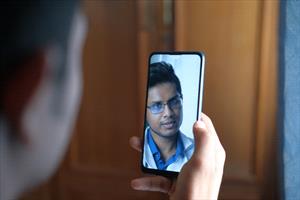Recording at veterinary appointment

Photo by Depositphotos
During some of the pandemic, veterinary clinics were forced to only allow the pet to enter the building. At times, it might have been possible for the veterinary team to allow real-time video feed via FaceTime and similar methods to the owner, so the owner could see what was happening with the pet and the care team could communicate with the owner. Thankfully, few clinics are remaining in this mode. Most are now allowing at least one member of the pet's human family to be in the room. But what happens when there are other people who also wish to be there?
Some veterinarians and their staff are happy accommodating an owner videotaping an examination or the euthanasia of a beloved pet. Should the owner request to do so, the team will readily set the lighting or wait for the filming to start before proceeding.
For other veterinarians and staff members, the idea of being recorded is very discomforting, whether that is due to shyness, anxiety, or fear of where the video might go and what it might mean in today's reactive and litigious society. What if there is a problem during the exam or procedure? What if something said is taken out of context? What if the video is edited in a way that misrepresents what really happened? Maybe they simply don't want to be on someone else's social media feed. The idea of making an error or having a statement misconstrued is already concerning to many veterinarians when there is only one or a few people in the room. No one likes to make a mistake regardless of how small it might be. No one wants to feel embarrassed or ashamed. The idea that that feeling might be broadcast to the neighbors, the entire community, or the world is even more mortifying. As a group, veterinarians are already known to have a high sense of perfectionism; the profession has an inordinate number of suicides? Being on camera is often something they prefer to avoid.
But you, as your pet's owner, would like to record the visit, for whatever reason. Maybe your spouse isn't able to be there but wants to know everything that is said. Maybe your son is away at college but wants to say good-bye to the dog he grew up with. Your reasons may be quite understandable, but please, before recording anything, ask for permission. Ask if the veterinarian and the team members are comfortable with being filmed. Respect any answer given, whether it is a flat-out “no, thank you” or a request for limits, such as not showing any faces or not posting it online.
Think of how you would feel if a client asked to film you at your work place. You might be absolutely fine with it, you might find it somewhat objectionable (bad hair day), or maybe it's in the category of “never, ever, ever, never.” Maybe you're fine with the idea but company policy states that it cannot be done or that you, in your role in the company, cannot give permission for such things. Whatever your answer is will not be what everyone else will choose: some will be okay with it, and some will not, no matter what the circumstances.
Just in case you were considering it, be aware that there are laws about secretly videotaping people, particularly when done on private property, such as in a veterinary hospital. These laws can vary by state and may vary based on whether or not the recording includes audio. Think of that and inform whomever requested the video of this legal obstacle; they may not know.
If you want to record anything in an exam room, be on the up-and-up about it. After all, the veterinarian-client relationship works best when there is trust. A secret or surreptitious recording does not exude trust. If the veterinarian learns a recording was made without their knowledge, there could be severe repercussions, the least of which could be getting removed as a client from the veterinary practice. Whether recording without permission is legal or not in your state is not the big issue. The main criteria is whether or not the veterinary team grants permission for you to take that video. If you receive permission, enjoy!